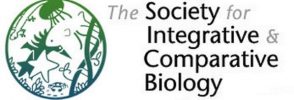Contents
Message from the Chair
Kenneth Welch, Jr., Chair.DCPB@sicb.org
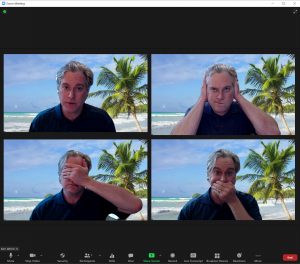
I hope this note finds you safe, healthy, and happy. The 2021 Virtual Annual Meeting was a huge success, and much of the credit is due to our fearless leaders. In particular, credit goes to (now past-) President Beth Brainerd, heroic Program Officer Jake Socha, and DCPB PO, Kristi Montooth. No, we couldn’t enjoy socializing in person with each other over frosty beverages, but the online format enabled unprecedented participation, especially from international members, university AND high school students! I also really enjoyed the chat function for asking and answering questions. It was convenient to take my time reviewing questions and answers from others.
DCPB co-sponsored seven society-wide symposia at the virtual meeting. These were,
- Blinded by the Light: Effects of Light Pollution across Diverse Natural Systems
- Genomic Perspectives in Comparative Physiology of Mollusks: Integration across Disciplines
- Biology Beyond the Classroom: Experiential Learning through Authentic Research, Design, and Community Engagement
- The Integrative Biology of Pigment Organelles
- The Biology of Sticky: Adhesive Silk, Fiber, and Glue Biomaterials Across Eukaryota
- Sending and Receiving Signals: Endocrine Modulation of Social Communication
- Biology’s Best Friend: Bridging Disciplinary Gaps to Advance Canine Science
Student participation in this meeting was as strong as it has ever been. This quality was reflected in the 13 oral and 6 poster DCPB Best Student Presentation entrants. With the continuing help of our wonderful members, we did identify a clear winner in each category. This year, our winners are:
- Oral: “Interactive effects of air temperature and density on flight physiology of honey bees” by Jordan Glass and Jon Harrison from Arizona State University
- Poster: “Developing circadian clock reporter cell lines using a CRISPR gene editing knockin approach” by Daniel Stanton, Hongzhi He, and Andrew C. Liu of the University of Florida
Congratulations to the winners, and to all the entrants, for their fine work.
Though we couldn’t convene for drinks and snacks in person immediately after the presentation, this year’s Bartholomew Award Lecture was nonetheless, outstanding! This year’s winner was Dr. Roslyn Dakin, assistant professor at Carleton University in Ottawa, Canada. Dr. Dakin gave an expansive and clear talk entitled, “The scaling of behavior: insights into competitive and cooperative systems.” If we are able to meet in person in Phoenix in 2022, I hope you will join us at the reception to celebrate both Dr. Dakin’s as well as the 2022 winner.
I would like to extend a heartfelt thanks to the Bartholomew Award Committee. The committee was composed of Kim Hammond (chair, and past-Divisional Chair), Cassie Stoddard, Carol Fassbinder Orth, Lars Tomanek, and Blair Wolf. The Division greatly appreciates the hard work of the Bartholomew Award Committees in selecting the awardees and extends sincerest thanks to John Lighton and Robin Turner of Sable Systems International for their continued gracious support of the Bartholomew Award. New nominations for the George Bartholomew Award are due by August 23, 2021 and should be sent to Bart.award@sicb.org. More about the Award can be found here.
As always, the end of the annual meeting brings with it a changing of the divisional guard. I would like to thank Kristi Montooth (University of Nebraska) who took over the position of Program Officer starting in 2019 and just ended her term. I don’t need to tell all of you how much work Kristi put in to ensure that we had a great meeting. I also want to thank Andrea Rummel (Brown University), who is ending a three-year run as DCPB’s Student/Postdoc Representative. She and the rest of SPDAC also made this meeting a great one in many ways. Thank you both for your service. I also want to thank Emily Cornelius Ruhs (University of South Florida) for her valuable assistance in organizing this year’s Best Student Presentation judging assignments. And, welcome to Maria Stager (University of South Carolina) as our incoming SPDAC representative!
I want to welcome Jon Harrison (Arizona State University) as our new Chair-Elect, and Mike Sears (Clemson University) as our new Program Officer. I look forward to working with them both and wish Mike good luck as we prepare for a 2022 meeting that will occur in an as-yet-to-be-determined format! Personally, I’m voting for “in person” because a trip to Phoenix in January sounds pretty nice right about now! I wish you all the best.
Message from the Program Officer
Mike Sears, DPO.DCPB@sicb.org
I want to thank Kristi Montooth for her service as our Divisional Program Officer over the past two years. Organizing our divisional program is no small task under normal circumstances. That said, Kristi and the Program Committee did a fantastic job pivoting to an online model on relatively short notice during a pandemic. This was no small task. Regardless, the symposia and talks supported by our division were a big success. Hopefully, I will continue in Kristi’s footsteps to maintain a high quality program.
In the past, I have worked in various capacities in SICB to promote the work of graduate students, postdocs, and early-career scientists, while also promoting diversity and inclusion. Moving forward, my goals for the division will not change in that respect. I am committed to developing symposia, workshops, and mentoring programs with those values in mind. These activities are some of the most important items that our society provides as they help promote our membership’s careers across all levels. I will also look for new opportunities to prepare our membership for an ever-changing academic landscape, including opportunities to engage mid-career researchers to contribute to our program. Their participation sometimes decreases as they take on many roles at this career stage and in their personal lives. I welcome any ideas or feedback to improve our division along those lines.
Many of the great ideas for initiatives that make SICB and its annual meeting more inclusive and supportive come from the next generation of scientists. I want to encourage the full participation of all members in the society and in our DCPB. To our student and postdoctoral members, please take the opportunity to engage in society business, vote, and participate in symposium and workshop development. Your science, voices, and visions are the future of the society and of DCPB. You can follow our Twitter feeds @sicb_dcpb, @SICB_SPDAC, and @SICBtweets. Please e-mail me at DPO.DCPB@sicb.org with any ideas that you may have for meeting activities that support a diverse membership and advance their scientific and professional goals.
Students, don’t forget about the opportunity to participate in the “Best Student Presentation” competitions. Thank you to everyone who volunteered, chaired a session, and participated in or scored the best student presentations this year. Your contributions make the meetings a success!
We hope to see you in Phoenix, AZ 2022, where DCPB will be co-sponsoring a diverse lineup of six symposia:
- “The deep and shallow history of aquatic life’s passages between marine and freshwater habitats”, Eric Schultz and Lisa Park-Boush
- “Ecoimmunology: what unconventional organisms tell us after two decades”, Vania Assis and Stefanny Monteiro
- “Open source solutions in experimental design”, Kirk Onthank and Richelle Tanner
- “Causal mechanisms of interspecific metabolic scaling patterns”, Jon Harrison and Meghan Duell
- “Phenological Plasticity: from Molecular Mechanisms to Ecological and Evolutionary Implications”, Cory Williams and Lise Aubry
- “DNA metabarcoding across disciplines: sequencing our way to greater understanding across scales of biological organization”, Anna Forsman, Michelle Gaither, and Anna Savage
- Please feel free to contact the organizers if you are interested in presenting in the oral or poster sessions that are complementary to these symposia.
Finally, we are looking for outstanding symposium proposals for the Austin 2023 meetings. The symposia are a vital component of our ICB journal. Our division has a history of co-sponsoring strong symposia that highlight emerging areas in integrative and comparative biology. Proposals will be due in late summer of 2021. Symposia that integrate across disciplines and include a diversity of speakers across speaker gender, background, and academic rank are more likely to gain broad support within SICB and with funding agencies such as NSF.
Student and postdoc members, you are the future of integrative and comparative biology, and we encourage you to take part in organizing a symposium or workshop; it is a great opportunity for professional and scientific development. Feel free to contact me at the e-mail address above or SICB Program Officer Jake Socha (programofficer@sicb.org) with ideas for symposia or with questions. I am happy to brainstorm ideas, facilitate collaborative symposium development, and provide past successful proposal examples to help in your proposal development and in obtaining external funding to help support the attendance of your speakers.
Finally, I encourage you to submit your research findings to the fully open-access SICB society journal, Integrative Organismal Biology. SICB members receive a significant discount for publication charges, making this one of the most reasonable open-access publishing options available!
Message from the Student and Postdoctoral Affairs Committee Representative
Maria Stager, mstager@mailbox.sc.edu
The Student and Postdoctoral Affairs Committee (SPDAC) contributed several items to this year’s virtual meeting! They produced numerous “how to” brochures for advance distribution, like “how to design a talk/poster,” as well as a video with pointers for first-time SICB goers, and they held “office hours” at their virtual booth. Their feature event was a virtual workshop on “Transferable Skills in Academia and Non-Academia,” which included a panel discussion of skills and careers led by ten expert panelists and followed by breakout-room discussions with the ~75 attendees.
Next year, we’ll again be hosting the SPDAC booth during the poster sessions, staffed with SPDAC committee members and other experts. The booth will feature skill shares and opportunities for networking, and we’ll be distributing those nifty brochures (including new brochures on mental health and resources for coping with grad school and postdoc life!). PLUS, we’ll be hosting a workshop on science communication! Stay tuned for more details about this as SICB 2022 approaches. If you have ideas for discussion or content that you’d like to see included, or any other suggestions, contact me via e-mail or the DCPB or SPDAC Twitter accounts (@sicb_dcpb and @SICB_SPDAC).
Don’t forget to take advantage of Charlotte Magnum Support for housing at the next meeting, apply for SICB Grants in Aid of Research, and check out other resources for support (many listed here for members). See you in Phoenix!
Message from the Secretary
Heather Liwanag, Secretary.DCPB@sicb.org
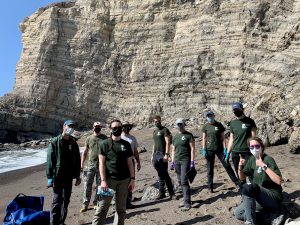
Hi there, DCPB! It has been quite the year, including a jam-packed virtual conference. If there is any news you would like to share with the DCPB membership, including job ads, postdoctoral positions, and opportunities for students, please feel free to contact me at Secretary.DCPB@sicb.org.
Elections for your new divisional Secretary will take place later this spring. We have two fantastic candidates for Secretary, Dr. Danielle Levesque and Dr. Caroline Williams. Ballots will be issued this month, so keep an eye out for the SICB Election e-mail and please vote! On behalf of the DCPB, I give my sincere thanks to these outstanding candidates for their willingness to serve our division.
I am so grateful to have been able to serve as your DCPB secretary. Thanks to all of our members for your continued support of the DCPB. I hope to see you all in Phoenix!
Candidates for Secretary
Danielle Levesque
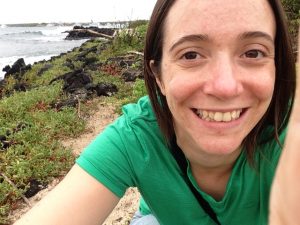
Current Position: Assistant Professor, School of Biology and Ecology, University of Maine
Education: B.Sc., McGill University (2006); M.Sc., Brock University (2008); Ph.D., University of KwaZulu-Natal (2014); Postdoctoral Fellow, Universiti Malaysia Sarawak (2014-2015)
Professional Experience: Assistant Professor, University of Maine (2015-present)
SICB Activities: I have been a SICB member since 2013 (DCPB and DEE), served as a judge for student posters/presentations, and have authored or co-authored 9 posters/presentations
Other Memberships: Canadian Society of Zoologists, Society for Experimental Biology, British Ecological Society
Research Interests: I am an evolutionary and ecological physiologist primarily interested in the comparative energetics and the evolution of mammalian temperature regulation. My research lies at the intersections of comparative physiology, ecology and evolutionary biology, and the synergies between these disciplines. Through field and laboratory based experiments, my students and I seek to understand how rigidity or flexibility in metabolism and body temperature regulation affects the energetics of a species, and how their evolutionary history has shaped these patterns.
Goals Statement: I joined SICB relatively late in my academic career, attending my first meeting during the final year of my PhD. At first, I was overwhelmed by the sheer scope and size of the meeting (it’s roughly four times the size of the Canadian Society of Zoologists meetings!) but I soon found a home and have enjoyed slowly building a SICB family over the past few years. It’s been a pleasure able to bring my students and introduce them to the wide world of comparative biology and to all of the wonderful SICB folks. The high caliber and variety of research presented at the meeting is always inspiring, and I particularly appreciate all of the student support both in terms of funding and mentoring. I am honored to receive the nomination to run for DCPB Secretary and I am grateful for the chance give back to the society. If elected, in addition to enthusiastically performing the duties of the Secretary, I plan on further promoting the division by increasing its presence on social media, and continuing to encourage new members to join SICB, attend the meetings, and become a part of the wider DCPB community.
Caroline M. Williams
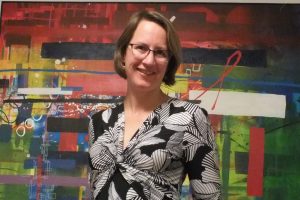
Current Positions: Associate Professor, Integrative Biology, University of California, Berkeley
Education: B.Sc., University of Otago, Dunedin, New Zealand (2002); M.Sc., University of Otago, Dunedin, New Zealand (2004); Ph.D., University of Western Ontario, London, Canada (2012); Postdoctoral Fellow, University of Florida, Gainesville (2012-201)
Professional Experience: Assistant Professor (2014-2020) and Associate Professor (2020-present), University of California, Berkeley; Associate Editor, Functional Ecology (2015-present); Associate Editor, Proceedings of the Royal Society B (2018-2020)
SICB Activities: DCPB nominations committee (2020), George Bartholomew Award committee (2019, 2020), George Bartholomew Award recipient (2018), Symposium co-organizer (with Gregory Ragland), “Evolutionary Impacts of Seasonality” (2017). Invited symposium presentations 2014 (“Macro and micro of nutrient effects in animal ecology and physiology”), and 2016 (“Beyond the Mean”). DCPB Student presentations judge (2016, 2017, 2018, 2020, 2021). Attended annual meetings: 2009, 2012, 2013, 2014, 2016, 2017, 2018, 2020, 2021 (virtual).
Other Memberships: Australian and New Zealand Society for Comparative Physiology and Biochemistry, British Ecological Society
Research Interests: My research focuses on how environmental variability drives evolution of metabolic physiology and life history in ectotherms. Research in my lab explores evolutionary impacts of seasonality, and consequences of winter climate change on performance and fitness of insects. Current work addresses the impact of spatial and temporal variation in snow cover on montane beetles in the Sierra Nevada. Another research theme addresses how life histories evolve to meet demands of variable environments. For this work, we use a comparative system of North American Gryllus field crickets with a flight polymorphism to understand the genomic, metabolic, and functional basis of this classic threshold trait. Beyond these specific research themes, I have broad interests in stress tolerances, thermal biology, nutrition and energetics in animals.
Goals Statement: I have benefited greatly from long and close association with SICB and DCPB, and would be glad to serve the division as secretary. If elected, my main goals will be to promote the field of comparative physiology and biochemistry through regular communication, and broaden participation in our division. I will work with other division officers to produce high-quality newsletters, and communicate notes from annual business meetings faithfully to members. I will continue to build the DCPB researcher’s database, highlighting the work of researchers from historically excluded and under-represented groups in “Scientist Spotlights” that can be downloaded as lecture slides. I will work with professional societies focused on broadening participation in STEM to promote student opportunities, such as SACNAS, ABRCMS, and minority-serving institutions.
